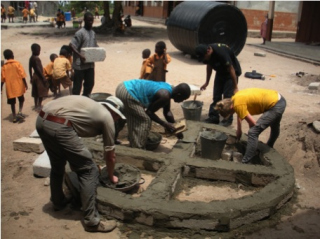About Ekumfi Ebuakwa
Ebuakwa is a community of about 250 homes with a population of
approximately 1.450 people. As it is closely located to the Gulf of Guinea,
community members' options to collect fresh water is limited since many of
the underground water sources are saline and not useable for basic
consumption needs.
Ebuakwa's community members are mainly dependent on farming and
selling charcoal for sustenance. The primary goods and food products
produced in Ebuakwa are cassava, maize, pineapple, plantains and
sugarcane. Ebuakwa currently has a CHPS Zone, a community
health care center. This makes it easy for community members to receive
medical attention when they require it. Almost all community members have
to mainly use "the bush" for defecation, an unhealthy practice that can lead
to diseases such as typhoid, diarrhea, cholera and other infectious diseases.
Global Brigades currently operates Medical, Dental, Microfinance, Business
and Water Brigades in the community. Ebuakwa also has a Community
Development Fund established through the Microfinance program, which
offers savings and social enterprise loans.
Ekumfi Ebuakwa's Water Challenge
The two main water challenges in the Ekumfi district are: water access
and water quality. Where piped water is not available, rainwater is the most
culturally accepted form of drinking water. When rainwater is not available,
community members will often go to rivers or small dug out ponds for water.
The main water issues faced by most communities in the Ekumfi District are
directly related to its geographic location, especially its close proximity to the sea. Salty seawater has intruded most communities' underground water resources, making most groundwater sources unusable for basic consumption needs and a possible health hazard. Besides ground water posing a possible threat to peoples' health, so do most surface water sources like rivers, ponds and streams. Ebuakwa's residents fetch water for domestic use out of a small shallow river within 10 minutes of the community's center. All domestic water use is from the stream and most women and children spend hours a day collecting water in open containers and carrying it back home. Not only is the water from the local stream used for drinking and cooking water, it is also used for washing and bathing purposes by Ebuakwa's community members as well as other communities located upstream.
The water from Ebuakwa's river is subject to high levels of contamination and is rarely treated before consumption. Using this water for personal consumption can lead to diarrhea, cholera, skin rash and other water related diseases and infections. One of the few safe water options for Ebuakwa's community members is purchasing water sachets but this is an unsustainable practice as well as an unreliable and in the long-term expensive option for drinking water.
The Water Solution for Ekumfi Ebuakwa

Water Brigades Ghana has focused on three types of water solutions in the Ekumfi District : School Rainwater Harvesters, Community-Wide Rainwater Harvesters and Household Rainwater Harvesters. In July 2012 the University of Birmingham constructed a School Rainwater Harvester in Ebuakwa to improve student health and studies as well as helped set up a School Water Club responsible for gathering clean water for each classroom. Each class had also been given a Family LifeStraw filter of Sawyer filter to use. Although the School Rainwater Harvester is beneficial to students while in school, it is not a solution that can provide consistent access to clean water especially because children often drink contaminated river water when at home.
Current Status
Last Visit: October 2013
Global Brigades followed up with the School Water Club to review its performance, identify challenges as well as see how the School Rainwater Harvester was functioning. Both the water system and the School Water Club were fully operational.
Project Photos
Visit Other Programs in Ekumfi Ebuakwa
Global Brigades strives to implement a model of Holistic Development in communities through a system of collectively implementing health, economic, and education initiatives to strategically meet a community's development goals. Learn more about the other programs being implemented in Ekumfi Ebuakwa:
![]() Business
Business CHW
CHW![]() Dental
Dental![]() Medical
Medical ![]() Microfinance
Microfinance
| Project Overview | |
|
Beneficiaries SRH |
380 |
| Volunteers | 20 |
| Project Cost |
2000 USD |
|
# of SRH systems |
1 |
| Additional Information |
| General Community Profile |
| Family Profiles |
| Water Brigade Update Report |
| Pre-Brigade Lesson Plan |
| On-Brigade Lesson Plan |
| School Rainwater Harvester Construction in Ekumfi Ebuakwa |
|||
| Water Brigades Chapter | Month | Volunteers | # SRHs Constructed |
| University of Birmingham | July, 2012 | 20 | 2 tanks |
